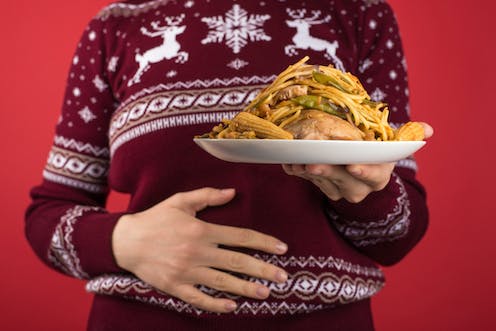
The holiday season is upon us, and with it, opportunities to indulge in festive treats. The proverbial saying “you eat with your eyes first” seems particularly relevant at this time of year.
The science behind eating behavior, however, reveals that the process of deciding what, when and how much to eat is far more complex than just consuming calories when your body needs fuel. Hunger cues are only part of why people choose to eat. As a scientist interested in the psychology and biology that drives eating behavior, I’m fascinated with how the brain’s experiences with food shape eating decisions.
So how do people decide when to eat?
Table of Contents
Eating with your eyes
Food-related visual cues can shape feeding behaviors in both people and animals. For example, wrapping food in McDonald’s packaging is sufficient to enhance taste preferences across a range of foods – from chicken nuggets to carrots – in young children. Visual food-related cues, such as presenting a light when food is delivered, can also promote overeating behaviors in animals by overriding energy needs.
In fact, a whole host of sensory stimuli – noises, smells and textures – can be associated with the pleasurable consequences of eating and influence food-related decisions. This is why hearing a catchy radio jingle for a food brand, seeing a television ad for a restaurant or walking by your favorite eatery can shape your decision to consume and sometimes overindulge.

Catherine McQueen/Moment via Getty Images
However, your capacity to learn about food-related cues extends beyond just stimuli from the outside world and includes the internal milieu of your body. In other words, you also tend to eat with your stomach in mind, and you do so by using the same learning and brain mechanisms involved in processing food-related stimuli from the outside world. These internal signals, also called interoceptive cues, include feelings of hunger and fullness emanating from your gastrointestinal tract.
It’s no surprise that the signals from your gut help set the stage for when to eat, but the role these signals play is more profound than you might expect.
Trust your gut
Feelings of hunger or fullness act as important interoceptive cues influencing your decision-making around food.
To examine how interoceptive states shape eating behaviors, researchers trained laboratory rats to associate feelings of hunger or satiety with whether they receive food or not. They did this by giving rats food only when they were hungry or full, such that the rats were forced to recognize those internal cues to calculate whether food would be available or not. If a rat is trained to expect food only when hungry, it would generally avoid the area where food is available when it feels full because it does not expect to be fed.
However, when rats were injected with a hormone that triggers hunger called ghrelin, they approached the food delivery location more frequently. This suggests that the rats used this artificial state of hunger as an interoceptive cue to predict food delivery and subsequently behaved like they expected food.
Interoceptive states are sufficient to shape feeding behaviors even in the absence of external sensory cues. One particularly striking example comes from mice that have been genetically engineered to be unable to taste food but nevertheless show preferences for specific foods solely by caloric content. In other words, rodents can use internal cues to shape their food-related decision-making, including when and where to eat and which foods they prefer.
These findings also suggest that feelings of hunger and the detection of nutrients is not restricted to the stomach. They also involve areas of the brain important for regulation and homeostasis, such as the lateral hypothalamus, as well as centers of the brain involved in learning and memory, such as the hippocampus.
What happens in vagus
The gut-brain axis, or the biochemical connection between your gut and your brain, shapes feeding behaviors in many ways. One of them involves the vagus nerve, a cranial nerve that helps control the digestive tract, among other things.
The vagus nerve rapidly communicates nutrient information to the brain. Activating the vagus nerve can induce a pleasurable state, such that mice will voluntarily perform a behavior, such as poking their nose through an open port, to stimulate their vagus nerve. Importantly, mice also learn to prefer foods and places where vagal nerve stimulation occurred.
The vagus nerve plays an essential role in not only communicating digestive signals but also an array of other interoceptive signals that can affect how you feel and behave. In people, vagal nerve stimulation can improve learning and memory and can be used to treat major depression.
Benefits of interoceptive awareness
Your body’s capacity to use both external and internal cues to regulate how you learn and make decisions about food highlights the impressive processes involved in how you regulate your energy needs.
Poor interoceptive awareness is associated with a range of dysfunctional feeding behaviors, such as eating disorders. For instance, anorexia may result when interoceptive signals, such as feelings of hunger, are unable to trigger the motivation to eat. Alternatively, the inability to use the feeling of fullness to dampen the rewarding and pleasurable consequences of eating palatable food could result in binge eating.
Your interoceptive signals play an important role in regulating your daily eating patterns. During the holidays, many stressors from the outside world surround eating, such as packed social calendars, pressures to conform and feelings of guilt when overindulging. At this time, it is particularly important to cultivate a strong connection to your interoceptive signals. This can help promote intuitive eating and a more holistic approach to your dietary habits. Rather than fixating on external factors and placing conditions on your eating behavior, enjoy the moment, deliberately savor each bite and provide time for your interoceptive signals to function in the role they are designed to play.
Your brain evolved to sense your current energy needs. By integrating these signals with your experience of your food environment, you can both optimize your energetic needs and enjoy the season.
![]()
Alexander Johnson receives funding from the National Institute of Health
























